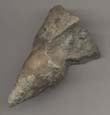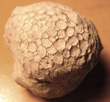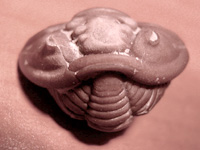Ordovician Cnidarian Fossils
The Cnidarian phylum is found exclusively in aquatic environments.
It includes corals, jellyfish, anemones, and medusae. The phylum's
name is derived from the Greek word "cnidos" which means stinging
nettle and is appropriately named due to the nematocysts that eject
barbed threads with poison. Members of this group are either radially
or biradially symmetric. Members typically fall into two groups,
medusae such as jellyfish, and polyps, such as corals.
Click on any image to see a larger, more detailed
view
Class:Anthozoa
Subclass:Zoantharia
Order:Rugosa
|
Genus/species:
|
Grewingkia canadensis
|
|
Images
|





|
|
Notes:
|
First two specimens are a solitary rugose coral specimen about 7.5 cm in length.
Internal structure not visible since it is encased in matrix. Small amounts of matrix still remain on exterior.
Third specimen is a horn coral 4.34 cm in length.
Fourth specimen is 6.06 cm in length.
Fifth specimen is 5.96 cm in length and has been broken to reveal some of the internal structure.
|
Class:Anthozoa
Subclass:Rugosa
Order:Stauriida
|
Genus/species:
|
Favistina stellata
|
|
Images
|

|
|
Notes:
|
Nearly spherical coral about 3.25 cm in diameter.
|
|
